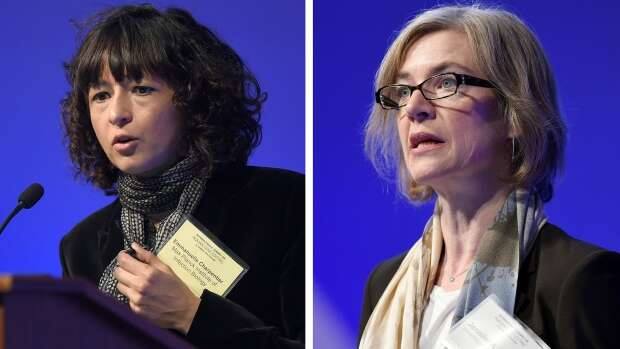Two scientists won the Nobel Prize in chemistry Wednesday for developing a way of editing genes likened to “molecular scissors” that offer the promise of one day curing inherited diseases.
Working on opposite sides of the Atlantic, Frenchwoman Emmanuelle Charpentier and American Jennifer A. Doudna came up with a method known as CRISPR-cas9 that can be used to change the DNA of animals, plants and microorganisms with extremely high precision. It is the first time two women have won the chemistry Nobel together.
Their work allows for laser-sharp snips in the long strings of DNA that make up the “code of life,” allowing scientists to precisely edit specific genes to remove errors that lead to disease.
“There is enormous power in this genetic tool, which affects us all,” said Claes Gustafsson, chair of the Nobel Committee for Chemistry. “It has not only revolutionized basic science but also resulted in innovative crops and will lead to groundbreaking new medical treatments.”
Gustafsson said that, as a result, any genome can now be edited “to fix genetic damage.”
But he cautioned that the “enormous power of this technology means we have to use it with great care.”
It has already raised serious ethical questions. Most of the world became more aware of CRISPR in 2018 when Chinese scientist He Jiankui revealed he had helped make the world’s first gene-edited babies, to try to engineer resistance to future infection with the AIDS virus. His work was denounced worldwide as unsafe human experimentation because of the risk of causing unintended changes that can pass to future generations, and he’s currently in prison.
Pernilla Wittung-Stafshede, a member of the Nobel Committee, noted that the method developed by the two biochemists has revolutionized the life sciences.
“The genetic scissors were discovered just eight years ago, but have already benefited humankind greatly,” she said.
The Broad Institute at Harvard and MIT have been in a long court fight over patents on CRISPR technology, and many other scientists did important work on it, but Doudna and Charpentier have been most consistently honoured with prizes for turning it into an easily usable tool.
Dr. Francis Collins, who led the drive to map the human genome, said CRISPR “has changed everything” about how to approach solutions to diseases with a genetic cause, such as sickle cell disease.

“You can draw a direct line from the success of the human genome project to the power of CRISPR-cas to make changes in the instruction book,” said Collins, director of the National Institutes of Health that helped fund Doudna’s work.
The prestigious award comes with a gold medal and prize money of 10 million kronor (more than $1.1 million), courtesy of a bequest left more than a century ago by the prize’s creator, Swedish inventor Alfred Nobel. The amount was increased recently to adjust for inflation.
Photo credit: AP Photo/Susan Walsh, File
News source: The Associated Press











